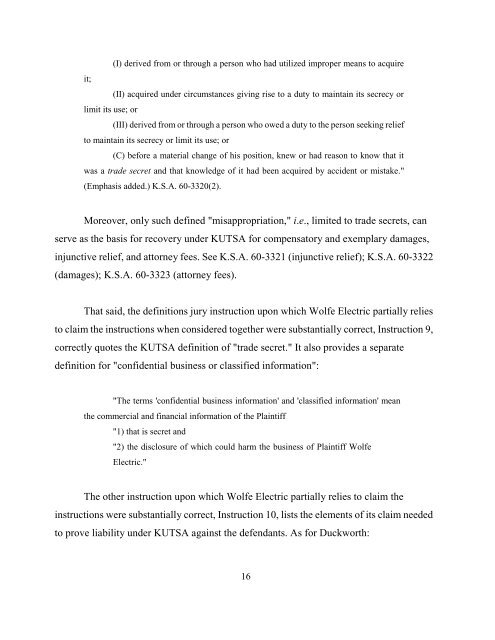Kansas Supreme Court - 99536 â Wolfe Electric, Inc. v. Duckworth
Kansas Supreme Court - 99536 â Wolfe Electric, Inc. v. Duckworth
Kansas Supreme Court - 99536 â Wolfe Electric, Inc. v. Duckworth
Create successful ePaper yourself
Turn your PDF publications into a flip-book with our unique Google optimized e-Paper software.
(I) derived from or through a person who had utilized improper means to acquire<br />
it;<br />
(II) acquired under circumstances giving rise to a duty to maintain its secrecy or<br />
limit its use; or<br />
(III) derived from or through a person who owed a duty to the person seeking relief<br />
to maintain its secrecy or limit its use; or<br />
(C) before a material change of his position, knew or had reason to know that it<br />
was a trade secret and that knowledge of it had been acquired by accident or mistake."<br />
(Emphasis added.) K.S.A. 60-3320(2).<br />
Moreover, only such defined "misappropriation," i.e., limited to trade secrets, can<br />
serve as the basis for recovery under KUTSA for compensatory and exemplary damages,<br />
injunctive relief, and attorney fees. See K.S.A. 60-3321 (injunctive relief); K.S.A. 60-3322<br />
(damages); K.S.A. 60-3323 (attorney fees).<br />
That said, the definitions jury instruction upon which <strong>Wolfe</strong> <strong>Electric</strong> partially relies<br />
to claim the instructions when considered together were substantially correct, Instruction 9,<br />
correctly quotes the KUTSA definition of "trade secret." It also provides a separate<br />
definition for "confidential business or classified information":<br />
"The terms 'confidential business information' and 'classified information' mean<br />
the commercial and financial information of the Plaintiff<br />
"1) that is secret and<br />
"2) the disclosure of which could harm the business of Plaintiff <strong>Wolfe</strong><br />
<strong>Electric</strong>."<br />
The other instruction upon which <strong>Wolfe</strong> <strong>Electric</strong> partially relies to claim the<br />
instructions were substantially correct, Instruction 10, lists the elements of its claim needed<br />
to prove liability under KUTSA against the defendants. As for <strong>Duckworth</strong>:<br />
16
















